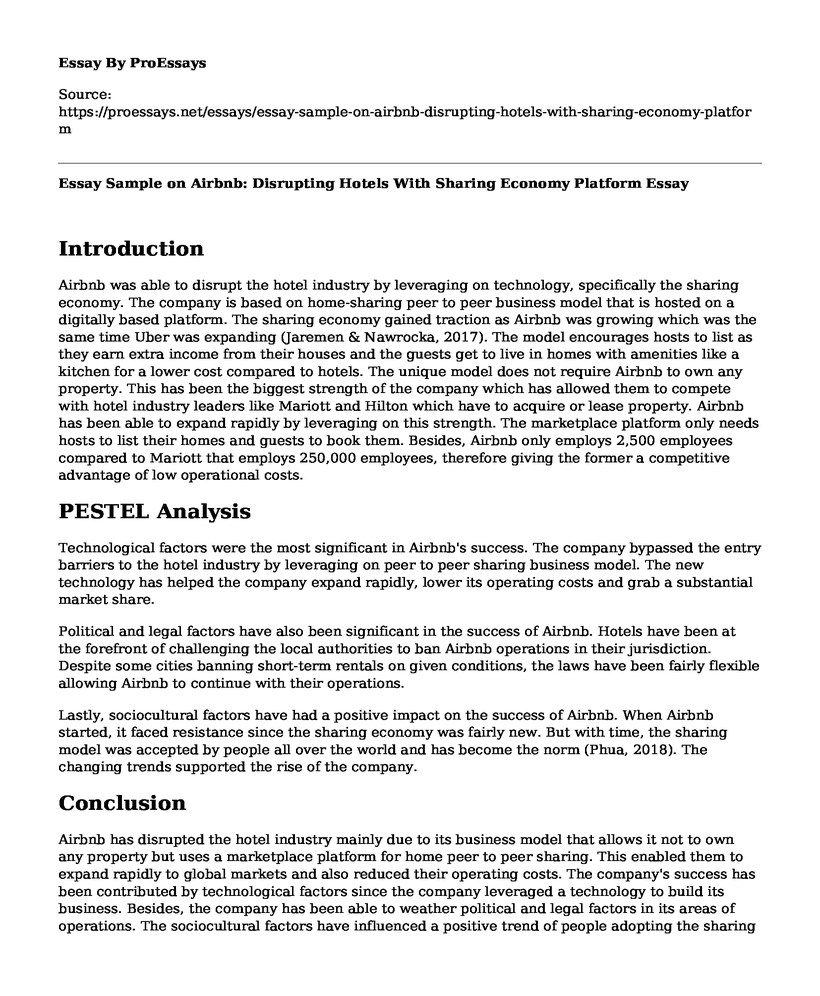Introduction
Airbnb was able to disrupt the hotel industry by leveraging on technology, specifically the sharing economy. The company is based on home-sharing peer to peer business model that is hosted on a digitally based platform. The sharing economy gained traction as Airbnb was growing which was the same time Uber was expanding (Jaremen & Nawrocka, 2017). The model encourages hosts to list as they earn extra income from their houses and the guests get to live in homes with amenities like a kitchen for a lower cost compared to hotels. The unique model does not require Airbnb to own any property. This has been the biggest strength of the company which has allowed them to compete with hotel industry leaders like Mariott and Hilton which have to acquire or lease property. Airbnb has been able to expand rapidly by leveraging on this strength. The marketplace platform only needs hosts to list their homes and guests to book them. Besides, Airbnb only employs 2,500 employees compared to Mariott that employs 250,000 employees, therefore giving the former a competitive advantage of low operational costs.
PESTEL Analysis
Technological factors were the most significant in Airbnb's success. The company bypassed the entry barriers to the hotel industry by leveraging on peer to peer sharing business model. The new technology has helped the company expand rapidly, lower its operating costs and grab a substantial market share.
Political and legal factors have also been significant in the success of Airbnb. Hotels have been at the forefront of challenging the local authorities to ban Airbnb operations in their jurisdiction. Despite some cities banning short-term rentals on given conditions, the laws have been fairly flexible allowing Airbnb to continue with their operations.
Lastly, sociocultural factors have had a positive impact on the success of Airbnb. When Airbnb started, it faced resistance since the sharing economy was fairly new. But with time, the sharing model was accepted by people all over the world and has become the norm (Phua, 2018). The changing trends supported the rise of the company.
Conclusion
Airbnb has disrupted the hotel industry mainly due to its business model that allows it not to own any property but uses a marketplace platform for home peer to peer sharing. This enabled them to expand rapidly to global markets and also reduced their operating costs. The company's success has been contributed by technological factors since the company leveraged a technology to build its business. Besides, the company has been able to weather political and legal factors in its areas of operations. The sociocultural factors have influenced a positive trend of people adopting the sharing economy, therefore, creating success for the company.
References
Jaremen, D., & Nawrocka, E. (2017). AIRBNB COMPETITIVENESS ON THE HOSPITALITY MARKET SECTOR. Prace Naukowe Uniwersytetu Ekonomicznego we Wroclawiu, (473), 286-296. doi:10.15611/pn.2017.473.26
Phua, V. C. (2018). Perceiving Airbnb as sharing economy: the issue of trust in using Airbnb. Current Issues in Tourism, 22(17), 2051-2055. doi:10.1080/13683500.2018.1440539
Cite this page
Essay Sample on Airbnb: Disrupting Hotels With Sharing Economy Platform. (2023, Feb 06). Retrieved from https://proessays.net/essays/essay-sample-on-airbnb-disrupting-hotels-with-sharing-economy-platform
If you are the original author of this essay and no longer wish to have it published on the ProEssays website, please click below to request its removal:
- Paper Example on Google's Business Model
- Essay Sample on Industrialization's Impact on Environment: The Global Challenge of Contaminants
- Staff Recognition: Rewarding Performance to Boost Morale - Essay Sample
- Paper Example on Globalization: Shaping the Present and Future
- Essay Example on Developing Employability Skills for Efficient Employee Performance
- Computers and Globalization - Report Example
- The Short-Run and Long-Run Relationship Between Unemployment and Inflation - Essay Example







